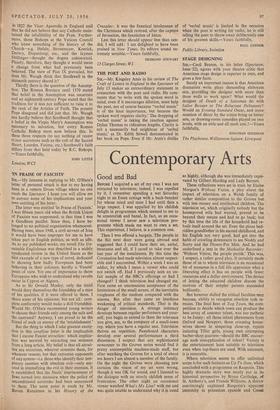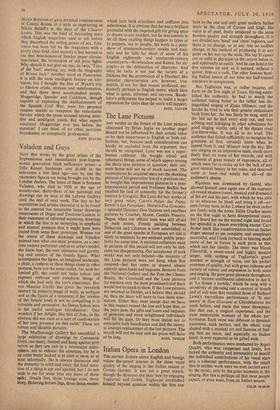Contemporary Arts
Good and Bad
BEFORE I acquired a set of my own I was not attracted by television; indeed, I was repelled by it. I remember spending a wet Saturday night in an Essex cottage with a back-bencher for whose mind and taste I had until then a large respect. I was appalled by his childish delight in programmes which seemed to me to be amateurish and banal. In fact, as an occa- sional viewer I never saw a television pro- gramme which made me want to own a set. This experience, I believe, is a common one.
Then I was offered a bargain. The people in the flat next door were going abroad and suggested that I could have their set, aerial, insurance and all, if I cared to take over the last year of the instalments. By this time the Coronation had made television almost respect- able and I succumbed. Within a week I was an addict, by which I mean a viewer who could not switch off. Had I previously seen an un- fair sample of the BBC's offerings or had I changed? I think television had changed me. First came an unconscious acceptance of the limitations of the small screen, of the inevitable roughness of the medium compared with the cinema. But after that came an insidious weakening of critical standards. That is the danger of television. A strange intimacy develops between regular performers and your- self; you begin to extend to them the tolerance you give, say, to the company of a small-town rep. where you have a regular seat. Television thrives on repetition. Pasteboard characters develop over several performances a third dimension. I suspect that any sophisticated newcomer to the Groves series would find it pretty contemptible machine-made stuff, but after watching the Groves for a total of about ten hours I am almost a member of the family. On the night the Groves were choosing new curtains the vision of my set went wrong, though it was OK for sound, and I listened to the dialogue with an utterly childish sense of frustration. The other night an occasional viewer watched What's My Line? with me and was quite unable to understand why it is rated so highly, although she was immediately capti- vated by Gilbert Harding and Lady Barnett.
These reflections were set in train by Elaine Morgan's Without Vision, a play about the impact of television on a Welsh family of rather similar composition to the Groves but with less money and intellectual children. The television set, which originally nobody but the houseproud wife had wanted, proved to be beyond their means and had to go back; but by this time the life of the household had re- built itself around the set. Even the pious bed- ridden grandfather in his second childhood, and his English not very good, had got into the habit of crawling downstairs to see Noddy and Sooty and the Flower-Pot Men. And he had underlined a text in the Methodist Recorder: 'Without Vision, the people perish.' This was, I suspect, a rather good play. It certainly made those of us to whom television is an occasional bit of nonsense in a full life appreciate what a liberating effect it has on people with fewer resources and a duller environment. The device of letting the educated children discuss the motives of their simpler parents succeeded brilliantly.
But however dulled the critical faculties may become, ability to recognise absolute tosh re- mains. The final heat of Top Town, the com- petition to decide which town can produce the best array of amateur talent, was too pathetic to be funny : all those infant phenomena from Oxford and Newport, those crooning house- wives shown in simpering close-up, typists imitating Tiller girls, young men attempting barber-shop quartets—should the BBC encour- age such misapplication of talent? Variety is the entertainment least suitable to television even when top-liners are used. With amateurs, it is execrable.
Where television seems to offer unlimited scope is for such features as Up To Date, which concluded with a programme on Rasputin. This highly dramatic story was neatly put in its historical perspective by Bryan Cartledge, of St. Anthony's, and Francis Williams. A doctor convincingly explained Rasputin's apparent immunity to potassium cyanide and Count Alexis Bobrinskoy gave personal reminiscences of Czarist Russia in a style as captivating as Nikita Balieff's in the days of the Chauve- Souris. This was the kind of interesting story which English magazines used to tell before they discoltered the selling power of sex. Tele- vision has been left by the magazines with a pretty clear field. And recently it has learned to use that time-honoured Sunday paper circula- tion-raiser, the re-creation of old prize fights. Why should it not give us, too, its twin, 'Tales of the Turf,' starting, say, with the biography of Brown Jack? Another word on Panorama; it is still the most intelligent feature on tele- vision, but I thought the film of Wyatt's trip to Harlow crude, obvious and uninformative, and that those three accomplished people, Muggcridge, Spender and Cockburn, though capable of explaining the disillusionment of the Spanish Civil War, were for personal reasons unable to recapture the remarkable fervour which the cause aroused among sensi- tive and intelligent youth. But what superb assurance Muggeridge now has before the cameras! I can think of no other part-time broadcaster so completely professional.
JOIIN BEAVAN



















































 Previous page
Previous page